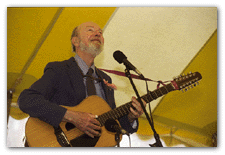Main Menu · Search · Current Issue · Contact · Archives · Centennial · Letters to the Editor · FAQs
![]()
Main Menu · Search · Current Issue · Contact · Archives · Centennial · Letters to the Editor · FAQs
![]()
| Commencement Day, 1996 | Medical Dean |
| Money Maven | Hail, Fellow! |
| New Pathway Extended | Seeger of Truth |
| Heard at Harvard | The Undergraduate |
| Crimson on the Tube | Sports |
| Phillips Brooks House | The University |

![]()
When Pete Seeger '40 was a 16-year-old student at the woodsy Avon Old Farms School in Connecticut, he decided to become a hermit. "I thought it was the only way to be honest," he recalls. "If you were drawn into the world, you were bound to become a hypocrite." But when he expressed this conviction to some Jewish friends steeped in a tradition of humanism and social concern, they had a convincing rebuttal: "Oh, you'll be nice and pure, and let the rest of the world destroy itself."
His friends seem to have prevailed. Seeger has lived the opposite of a hermit's existence, throwing himself wholeheartedly into a range of causes that almost form a road map of the progressive movements of the twentieth century. He is best known as a banjo-playing folk singer and songwriter (his songs include "Where Have All the Flowers Gone?," "Turn, Turn, Turn," and "If I Had a Hammer"). But in addition to singing at schools and colleges, and for unions, peace rallies, and civil-rights marches, Seeger's endeavors range from music publishing-as a prime mover behind Sing Out! magazine-to environmental education. He helped start the Clearwater organization, which sails a 106-foot traditional sailboat along the Hudson River and each year introduces tens of thousands of schoolchildren to the problems of pollution.
It has not been a typical Harvard man's career, though Seeger did come from a Harvard family. His father, Charles Seeger '08, was an eminent musicologist; the music department's Seeger Room is named in his memory. Pete Seeger, though, never finished college. While at Harvard in the late 1930s, Seeger claims to have been "disappointed in the academic cynicism of the department of sociology, which was my major." Playing the tenor banjo, he auditioned unsuccessfully for the Harvard Jazz Band. "I could play well by ear, but when it came to sheet music, I couldn't read chords very well," he says.
Seeger got so interested in the Harvard Student Union ("a coalition of pacifists, socialists, and communists," as he recalls) that his grades fell and he lost his scholarship, which paid a quarter of his annual expenses of $1,200. When he left the College, a dean told him, "Peter, if you ever decide what you really want to do, we'd be glad to have you back here again."
These words proved prophetic. Harvard warmly welcomed Seeger back this spring, when he returned for Arts First weekend as the second recipient of the Harvard Arts Medal, presented annually to a Harvard graduate who has made an important contribution to the arts. "I was tempted to accept on behalf of all Harvard dropouts," Seeger said, to laughter and cheers, at the award ceremony, held under a tent near the Science Center. Seeger observed that "Harvard has stayed so remarkably fresh, in spite of being so big," and soon plunged into doing what he does best, leading several hundred people in song. He even encouraged the group to harmonize, noting that "One thing the musicians could teach the politicians is that not everyone has to sing the melody."
Seeger likes to think of himself as a "sing-along song leader," and in that role he has much of the world singing the melodies and harmonies he loves. In addition to singing every week at places near his upstate New York home, he tours the South and West each year, and usually makes one overseas concert tour. He often sings with Tao Rodriguez, one of his five grandchildren. Rodriguez grew up in Nicaragua and sings well, which Seeger says helps compensate for his own "creaky old voice."
Perhaps so, but few listeners, at Harvard or elsewhere, seem to have a problem with Seeger's vocals. Nor do fellow musicians. Recently, flutist and New Age megastar Paul Winter released a CD devoted to Seeger music (including Seeger vocals) that is titled simply, Pete. It all makes sense; Seeger is a connector, someone who brings people together. He now says, "My main aim in life is to try to be a link in a chain."
Main Menu · Search · Current Issue · Contact · Archives · Centennial · Letters to the Editor · FAQs
![]()
Harvard Magazine · 7 Ware Street · Cambridge, MA 02138 · Phone (617) 495-5746